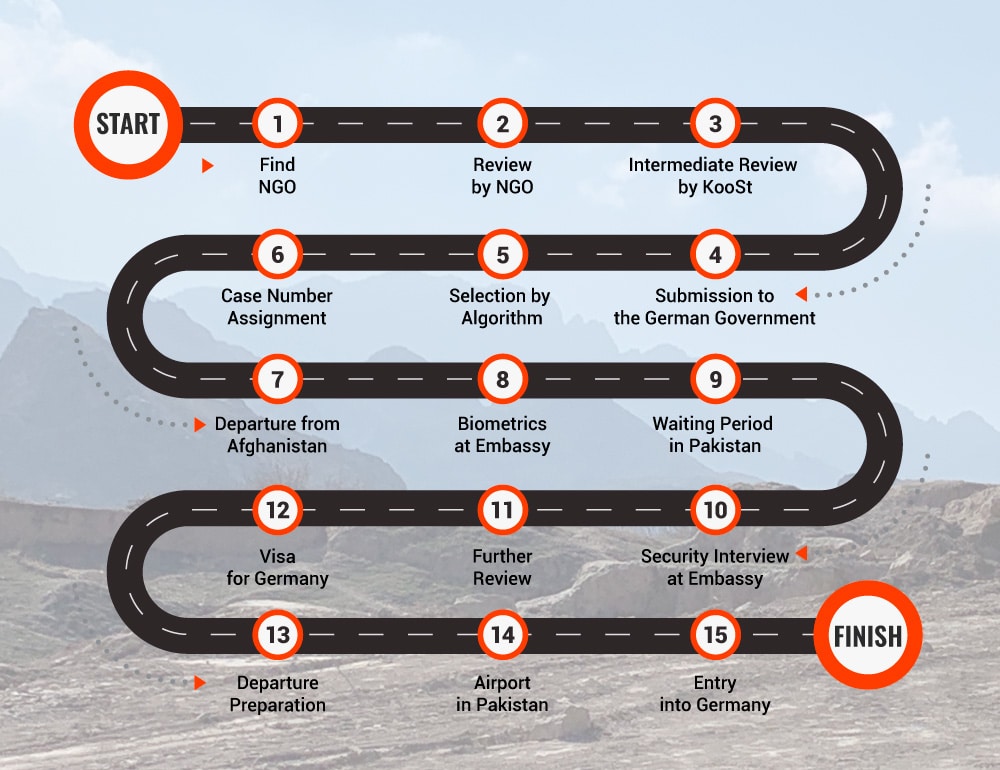Federal Admission Program
The German Federal Government launched the Federal Admission Program for At-Risk Afghans in October 2023.
How does the program work and where do we stand today?

Registrations through NGOs, known as “authorized reporting organizations,” are always free of charge.
The German Ministries of the Interior and Foreign Affairs launched a humanitarian admission program, intended to admit 1,000 individuals per month (including family members). You can view the current statistics for the program [here].
The program has since been terminated (as of 2025).
We have compiled the following questions and answers about the Federal Admission Program. Please note that this information is still preliminary and is continuously being updated.
The target group for admission under the Federal Admission Program consists of Afghan nationals who are still in Afghanistan, and who:
Victims of serious individual violations of women’s rights,
Victims of homophobic or transphobic human rights violations,
Prominent representatives of religious groups or communities.
No. Local travel agencies play no role in this program.
Only a limited number of NGOs based in Germany are authorized to register individuals for the program. These official reporting organizations are located in Germany and do not charge any money for registration.
WARNING – If any organization asks for money in exchange for registration, it is a scam. Recently, we’ve seen an increase in people falsely claiming to represent Kabul Luftbrücke and demanding money.
If you encounter such incidents, please report them to info@kabulluftbruecke.de.
Here you’ll find other legal migration pathways that are not tied to specific deadlines.

Germany is home to numerous renowned colleges and universities and attracts many international students. If you wish to study in Germany, you will need a residence permit for the purpose of studying.
Before applying for your visa, it is important to obtain an admission letter from a German university or college. You must also prove that you have sufficient financial means to support yourself—typically through a blocked bank account with a current minimum balance of €11,208 per year (as of 2024) or a scholarship.
Additional requirements may include proof of German or English language skills (depending on the study program) and health insurance. It is strongly recommended to check the specific requirements of your chosen university as well as the responsible German embassy or foreigners’ authority as early as possible.

If you are already trained as a skilled worker, you will need a company in Germany that offers you a job and applies for the visa together with you.
If you want to start vocational training in Germany, you need a training company that offers you a placement. In addition, sufficient German language skills are required to attend vocational school and follow the lessons. In many cases, a language level of at least B1 is expected.
There may be additional requirements, such as recognition of your qualifications or approval from the Federal Employment Agency. It is advisable to gather all necessary documents early and stay informed about the current regulations.

A family reunification visa can be applied for if a member of your immediate family (spouse, minor children, or parents of minor children) already lives in Germany and holds a valid residence permit.
In exceptional cases, reunification with more distant relatives may also be possible—especially when it involves underage individuals in need of protection. However, these procedures are more complex and require especially thorough examination.
Because the process is often complex and time-consuming, it is strongly recommended to seek legal support from lawyers or counseling centers as early as possible. Typically, the application is submitted in Germany, while the applicant must attend a visa appointment at the German embassy in Tehran or Islamabad.
Waiting times for family reunification visas are long—in many cases, it can take a year or more for the visa to be issued. Therefore, it is essential to be well prepared and to submit all required documents completely to avoid delays.
We focus on evacuations from Afghanistan, fight for human rights – especially for women and girls – and help where we are urgently needed.